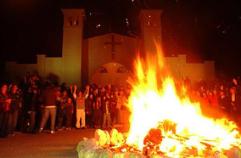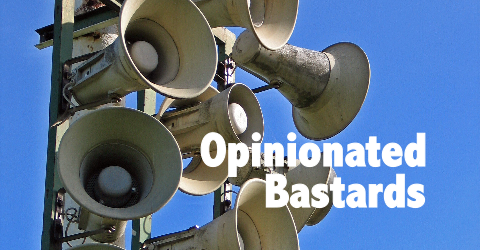So: The Most Reverend Doctor Dickhead1 — perhaps satisfied that he had attracted sufficient public attention on to his previously (and deservedly) unknown self — didn’t burn his Korans on 9/11. IMHO that’s good: whatever kind of legitimate protest one might think up (I speculate below) that involves a flaming Koran, he is the wrong person to be doing it, for the wrong reasons, on the wrong day.
But the discussion in the secularist blogosphere raised the more general question of the ethics of burning books. Ed Brayton (perhaps not surprisingly) is against it in all cases, and a number of other commenters  on various blogs agree. As someone whose personal library really needs a second house to keep it in, and who has difficulty trashing even old, dilapidated mass-market paperbacks, I sympathize. But on consideration, this absolute refusal strikes me as a fetishization of books as objects. Nor am I moved by “BUT OMG THE NATZEEEEZ BURNINATED BOOKS!!!!”. Oh, please — yes, and Hitler was a vegetarian, too. Things are not evil because the Nazis did them; rather the Nazis were evil because they did things we regard as evil on other grounds. Burning every available copy of a book to prevent anyone from reading it is a form of censorship, and therefore wrong. Burning a few copies (which you legally own) of a widely-available work is not in the same category (at least, not obviously so to me).
on various blogs agree. As someone whose personal library really needs a second house to keep it in, and who has difficulty trashing even old, dilapidated mass-market paperbacks, I sympathize. But on consideration, this absolute refusal strikes me as a fetishization of books as objects. Nor am I moved by “BUT OMG THE NATZEEEEZ BURNINATED BOOKS!!!!”. Oh, please — yes, and Hitler was a vegetarian, too. Things are not evil because the Nazis did them; rather the Nazis were evil because they did things we regard as evil on other grounds. Burning every available copy of a book to prevent anyone from reading it is a form of censorship, and therefore wrong. Burning a few copies (which you legally own) of a widely-available work is not in the same category (at least, not obviously so to me).
 With that out of the way (and assuming the reader assents to the above), we can ask: is it ever legitimate to burn a Koran (or any book) as an act of protest? This sort of act is symbolic in intent; a piece of political theatre intended to make a point. The question is: What symbol? What point?
With that out of the way (and assuming the reader assents to the above), we can ask: is it ever legitimate to burn a Koran (or any book) as an act of protest? This sort of act is symbolic in intent; a piece of political theatre intended to make a point. The question is: What symbol? What point?
One such intent might be to express our rejection and disdain for the ideas therein (in the case of the Koran or the Bible, perhaps the misogynist, genocidal or theocratic themes). The physical destruction of the book symbolizes one’s wish and intent to destroy (ie: discredit) those ideas with the metaphorical fire of one’s logic and the causticity of one’s scorn.
On the other hand, one can argue (with some merit) that the act of burning books is irredeemably tainted by its history; it can never escape its association with repeated attempts at censorship. No other symbolism can overcome the weight of history.
I’m not persuaded by that argument, but it suggests an important requirement on public demonstration: your intent (as opposed to other likely constructions) has to be clear, or made clear, to a reasonable observer (yeah, like those are ubiquitous….). That’s why the Gainesville Git’s proposed stunt was out of line: no one trusts his point to be anything other than “their religion is worser than ours” (which is a pretty low bar to set) combined with “Scarey Furriners who aren’t our religion killed 3000 of Our People”. Which suggests some further requirements on the burning of sacred books: only atheists get to do it (OK John, we’ll let in the agnostics, too, if you bring the hot dog buns). Moreover, we have to include texts from all major religions, and we also have to include non-religious works notable for their dogmatism, and being sources of oppression2.
So: who’s up for s’mores? Just be sure you have a point to make….
1. I refuse to give this loser any more notoriety by name. The only Terry Jones who matters was a member of the Monty Python troupe.
2. Chairman Mao’s Little Red Book comes to mind, as does Mein Kampf. Suggest your favorites in the comments.
